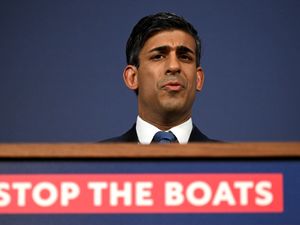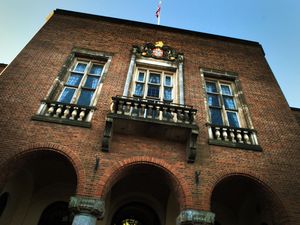Sunak ‘up for the fight’ against legal challenges to his small boats plan
The Prime Minister’s plans could face court action amid concerns it is an ‘asylum ban’.

Prime Minister Rishi Sunak has said he is “up for the fight” against any legal challenges to his plans to tackle small boat crossings, as ministers admitted they may fall foul of human rights laws.
Mr Sunak said on Tuesday there was “absolutely nothing improper” about his new legislation and said he is “confident” the Government would win any court action.
But Home Secretary Suella Braverman conceded it is likely the Illegal Migration Bill may be incompatible with the European Convention on Human Rights (ECHR).
Mr Sunak did not rule out withdrawing the UK from the convention if legal challenges stall his latest plan to “stop the boats”, as with the Rwanda policy.
The Prime Minister told a Downing Street press conference they were prepared to challenge any legal action.
“Of course we’re up for the fight, I wouldn’t be standing here if we weren’t,” he said, standing in front of a “stop the boats” branded podium. “But we’re confident that we’ll win.”
On the front page of the Bill, Ms Braverman acknowledges she cannot assure Parliament that the legislation is compatible with the convention but adds that “the Government nevertheless wishes the House to proceed with the Bill”.

Mr Sunak said there is “absolutely nothing improper or unprecedented” about the warning.
“We believe we are acting in compliance with international law, in compliance with the ECHR, and if challenged, as you may well be right, we’ve seen in these matters we do get challenged, we will fight that hard because we believe we’re doing the right thing and it is compliant with our obligations,” he added.
Ministers were facing pressure from the Conservative right to pull the UK out of the ECHR if legal challenges block the plans.
Mr Sunak said “we don’t believe it is necessary to leave the ECHR” but did not rule out the move when asked at his press conference.
In a letter to MPs and peers seen by the PA news agency, Ms Braverman conceded it was more than likely the Bill does not meet ECHR obligations.
“This does not mean that the provisions in the Bill are incompatible with the convention rights, only that there is a more (than) 50% chance that they may not be,” she wrote.
“Both Houses will have an opportunity to thoroughly scrutinise the Bill and, once approved, the measures in the Bill will have been expressly endorsed by Parliament and we would expect the courts to take that into account.”
The right to a family life, freedom from torture and the right to a fair trial were all issues being considered as potential challenges to the legislation. So too was the right to liberty, with concerns over the powers for indefinite detention.
The UN Refugee Agency said it was “profoundly concerned” by the Bill which it said would “amount to an asylum ban” and clearly breach the refugee convention.
“We urge the Government, and all MPs and peers, to reconsider the Bill and instead pursue more humane and practical policy solutions,” the UNHCR said.
The Law Society of England and Wales, which represents solicitors, said it would “carefully” analyse whether the plans impinge on access to justice as it issued a warning.
President Lubna Shuja said: “The rule of law is undermined if the UK Government takes the view that laws, international or domestic, can be broken.

“If a government breaks laws, it breaks trust with its own citizens and with international partners.
“We will be carefully combing the detail of this Bill to determine whether it will lead to the Home Office delivering a fair and workable process, and seeking clarity from the Government on whether it is compatible with the UK’s international obligations.”
Enver Solomon, chief executive of the Refugee Council, said: “It’s an admission by the Government that it’s in effect behaving like those countries that show disregard to international human rights conventions, the likes of Myanmar, Russia, Belarus.”
Ms Braverman alluded to the Bill’s “legal complexities” while announcing the plans in the House of Commons.
“Some of the nation’s finest legal minds have been, and continue to be involved in, its development,” she said.
Attorney General Victoria Prentis outlined some of the “legal measures” relating to the Bill to ministers during a Cabinet meeting earlier in the day.
Ms Braverman has previously called for the UK to leave the ECHR.





